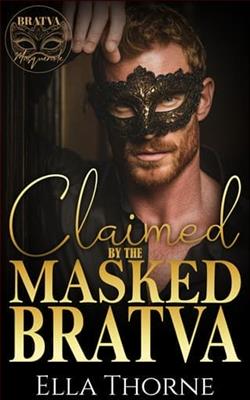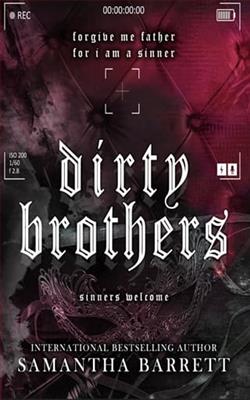“It seemed like it died when the mercenary’s body died,” Kote said. “We would have seen it leave.” He glanced over at Bast. “They’re supposed to look like a dark shadow or smoke when they leave the body, aren’t they?”
Bast nodded. “Plus, if it had hopped out, it would have just started killing folk with the new body. That’s what they usually do. They switch and switch until everyone is dead.”
The innkeeper gave Chronicler a reassuring smile. “See? It might not even have been a dancer. Perhaps it was just something similar.”
Chronicler looked a little wild around the eyes. “But how can we be sure? It might be inside anyone in town right now. . . .”
“It might be inside me,” Bast said nonchalantly. “Maybe I’m just waiting for you to let your guard down and then I’ll bite you on the chest, right over your heart, and drink all the blood out of you. Like sucking the juice out of a plum.”
Chronicler’s mouth made a thin line. “That’s not funny.”
Bast looked up and gave Chronicler a rakish, toothy grin. But there was something slightly off about the expression. It lasted a little too long. The grin was slightly too wide. His eyes were focused slightly to one side of the scribe, rather than directly on him.
Bast went still for a moment, his fingers no longer weaving nimbly among the green leaves. He looked down at his hands curiously, then dropped the half-finished circle of holly onto the bar. His grin slowly faded to a blank expression, and he looked around the taproom dully. “Te veyan?” he said in a strange voice, his eyes glassy and confused. “Te-tanten ventelanet?”
Then, moving with startling speed, Bast lunged from behind the bar toward Chronicler. The scribe exploded out of his seat, bolting madly away. He upset two tables and a half-dozen chairs before his feet got tangled and he tumbled messily to the floor, arms and legs flailing as he clawed his way frantically toward the door.
As he scrambled wildly, Chronicler darted a quick look over his shoulder, his face horrified and pale, only to see that Bast hadn’t taken more than three steps. The dark-haired young man stood next to the bar, bent nearly double and shaking with helpless laughter. One hand half-covered his face, while the other pointed at Chronicler. He was laughing so hard he could barely draw a breath. After a moment he had to reach out and steady himself against the bar.
Chronicler was livid. “You ass!” he shouted as he climbed painfully to his feet. “You . . . you ass!”
Still laughing too hard to breathe, Bast raised his hands and made weak, halfhearted clawing gestures, like a child pretending to be a bear.
“Bast,” the innkeeper chided. “Come now. Really.” But while Kote’s voice was stern, his eyes were bright with laughter. His lips twitched, struggling not to curl.
Moving with affronted dignity, Chronicler busied himself setting the tables and chairs to rights, thumping them down rather harder than he needed to. When at last he returned to his original table, he sat down stiffly. By then Bast had returned to stand behind the bar, breathing hard and pointedly focusing on the holly in his hands.
Chronicler glared at him and rubbed his shin. Bast stifled something that could, conceivably, have been a cough.
Kote chuckled low in his throat and pulled another length of holly from the bundle, adding it to the long cord he was making. He looked up to catch Chronicler’s eye. “Before I forget to mention it, folk will be stopping by today to take advantage of your services as a scribe.”
Chronicler seemed surprised. “Will they now?”
Kote nodded and gave an irritated sigh. “Yes. The news is already out, so it can’t be helped. We’ll have to deal with them as they come. Luckily, everyone with two good hands will be busy in the fields until midday, so we won’t have to worry about it until—”
The innkeeper’s fingers fumbled clumsily, snapping the holly branch and jabbing a thorn deep into the fleshy part of his thumb. The red-haired man didn’t flinch or curse, just scowled angrily down at his hand as a bead of blood welled up, bright as a berry.
Frowning, the innkeeper brought his thumb to his mouth. All the laughter faded from his expression, and his eyes were hard and dark. He tossed the half-finished holly cord aside in a gesture so pointedly casual it was almost frightening.
He looked back to Chronicler, his voice perfectly calm. “My point is that we should make good use of our time before we’re interrupted,” he said. “But first, I imagine you’ll want some breakfast.”
“If it wouldn’t be too much trouble,” Chronicler said.
“None at all,” Kote said as he turned and headed into the kitchen.
Bast watched him leave, a concerned expression on his face. “You’ll want to pull the cider off the stove and set it to cool out back.” Bast called out to him loudly. “The last batch was closer to jam than juice. And I found some herbs while I was out, too. They’re on the rain barrel. You should look them over to see if they’ll be of any use for supper.”
Left alone in the taproom, Bast and Chronicler watched each other across the bar for a long moment. The only sound was the distant thump of the back door closing.
Bast made a final adjustment to the crown in his hands, looking it over from all angles. He brought it up to his face as if to smell it. But instead he drew a deep lungful of air, closed his eyes, and breathed out against the holly leaves so gently they barely moved.
Opening his eyes, Bast gave a charming, apologetic smile and walked over to Chronicler. “Here.” He held out the circle of holly to the seated man.
Chronicler made no move to take it.
Bast’s smile didn’t fade. “You didn’t notice because you were busy falling down,” he said, his voice pitched low and quiet. “But he actually laughed when you bolted. Three good laughs from down in his belly. He has such a wonderful laugh. It’s like fruit. Like music. I haven’t heard it in months.”
Bast held the circle of holly out again, smiling shyly. “So this is for you. I’ve brought what grammarie I have to bear on it. So it will stay green and living longer than you’d think. I gathered the holly in the proper way and shaped it with my own hands. Sought, wrought, and moved to purpose.” He held it out a bit farther, like a nervous boy with a bouquet. “Here. It is a freely given gift. I offer it without obligation, let, or lien.”
Hesitantly, Chronicler reached out and took the crown. He looked it over, turning it in his hands. Red berries nestled in the dark green leaves like gems, and it was cunningly braided so the thorns angled outward. He set it gingerly on his head, and it fit snugly across his brow.
Bast grinned. “All hail the Lord of Misrule!” he shouted, throwing up his hands. He laughed a delighted laugh.
A smile tugged Chronicler’s lips as he removed the crown. “So,” he said softly as he lowered his hands into his lap. “Does this mean things are settled between us?”
Bast tilted his head, puzzled. “Beg pardon?”
Chronicler looked uncomfortable. “What you spoke of... last night . . .”
Bast looked surprised. “Oh no,” he said seriously, shaking his head. “No. Not at all. You belong to me, down to the marrow of your bones. You are an instrument of my desire.” Bast darted a glance toward the kitchen, his expression turning bitter. “And you know what I desire. Make him remember he’s more than some innkeeper baking pies.” He practically spat the last word.
Chronicler shifted uneasily in his seat, looking away. “I still don’t know what I can do.”
“You’ll do whatever you can,” Bast said, his voice low. “You will draw him out of himself. You will wake him up.” He said the last words fiercely.
Bast lay one hand on Chronicler’s shoulder, his blue eyes narrowing ever so slightly. “You will make him remember. You will.”
Chronicler hesitated for a moment, then looked down at the circle of holly in his lap and gave a small nod. “I’ll do what I can.”
“That’s all any of us can do,” Bast said, giving him a friendly pat on the back. “How’s the
shoulder, by the way?”
The scribe rolled it around, the motion seeming out of place as the rest of his body remained stiff and still. “Numb. Chilly. But it doesn’t hurt.”
“That’s to be expected. I wouldn’t worry about it if I were you.” Bast smiled at him encouragingly. “Life’s too short for you folk to fret over little things.”
Breakfast came and went. Potatoes, toast, tomatoes, and eggs. Chronicler tucked away a respectable portion and Bast ate enough for three people. Kote puttered about, bringing in more firewood, stoking the oven in preparation for the pies, and jugging up the cooling cider.
He was carrying a pair of jugs to the bar when boots sounded on the wooden landing outside the inn, loud as any knocking. A moment later the smith’s prentice burst through the door. Barely sixteen, he was one of the tallest men in town, with broad shoulders and thick arms.
“Hello Aaron,” the innkeeper said calmly. “Close the door, would you? It’s dusty out.”
As the smith’s prentice turned back to the door, the innkeeper and Bast tucked most of the holly below the bar, moving in quick, unspoken concert. By the time the smith’s prentice turned back to face them, Bast was toying with something that could easily have been a small, half-finished wreath. Something made to keep idle fingers busy against boredom.
Aaron didn’t seem to notice anything different as he hurried up to the bar. “Mr. Kote,” he said excitedly, “could I get some traveling food?” He waved an empty burlap sack. “Carter said you’d know what that meant.”
The innkeeper nodded. “I’ve got some bread and cheese, sausage and apples.” He gestured to Bast, who grabbed the sack and scampered off into the kitchen. “Carter’s going somewhere today?”
“Him and me both,” the boy said. “The Orrisons are selling some mutton off in Treya today. They hired me and Carter to come along, on account of the roads being so bad and all.”
“Treya,” the innkeeper mused. “You won’t be back ’til tomorrow then.”
The smith’s prentice carefully set a slim silver bit on the polished mahogany of the bar. “Carter’s hoping to find a replacement for Nelly, too. But if he can’t come by a horse he said he’ll probably take the king’s coin.”
Kote’s eyebrows went up. “Carter’s going to enlist?”
The boy gave a smile that was a strange mix of grin and grim. “He says there ain’t much else for him if he can’t come by a horse for his cart. He says they take care of you in the army, you get fed and get to travel around and such.” The young man’s eyes were excited as he spoke, his expression trapped somewhere between a boy’s enthusiasm and the serious worry of a man. “And they ain’t just giving folks a silver noble for listing up anymore. These days they hand you over a royal when you sign up. A whole gold royal.”
The innkeeper’s expression grew somber. “Carter’s the only one thinking about taking the coin, right?” He looked the boy in the eye.
“Royal’s a lot of money,” the smith’s prentice admitted, flashing a sly grin. “And times are tight since my da passed on and my mum moved over from Rannish.”
“And what does your mother think of you taking the king’s coin?”
The boy’s face fell. “Now don’t go takin’ her side,” he complained. “I thought you’d understand. You’re a man, you know how a fellow has to do right by his mum.”
“I know your mum would rather have you home safe than swim in a tub of gold, boy.”
“I’m tired of folk calling me ‘boy,’” the smith’s prentice snapped, his face flushing. “I can do some good in the army. Once we get the rebels to swear fealty to the Penitent King, things will start getting better again. The levy taxes will stop. The Bentleys won’t lose their land. The roads will be safe again.”
Then his expression went grim, and for a second his face didn’t seem very young at all. “And then my mum won’t have to sit all anxious when I’m not at home,” he said, his voice dark. “She’ll stop waking up three times a night, checking the window shutters and the bar on the door.”
Aaron met the innkeeper’s eye, and his back straightened. When he stopped slouching, he was almost a full head taller than the innkeeper. “Sometimes a man has to stand up for his king and his country.”
“And Rose?” the innkeeper asked quietly.
The prentice blushed and looked down in embarrassment. His shoulders slouched again and he deflated, like a sail when the wind goes out of it. “Lord, does everyone know about us?”
The innkeeper nodded with a gentle smile. “No secrets in a town like this.”
“Well,” Aaron said resolutely, “I’m doing this for her too. For us. With my coin and the pay I’ve saved, I can buy us a house, or set up my own shop without having to go to some shim moneylender.”
Kote opened his mouth, then closed it again. He looked thoughtful for the space of a long, deep breath, then spoke as if choosing his words very carefully. “Aaron, do you know who Kvothe is?”
The smith’s prentice rolled his eyes. “I’m not an idiot. We were telling stories about him just last night, remember?” He looked over the innkeeper’s shoulder toward the kitchen. “Look, I’ve got to get on my way. Carter’ll be mad as a wet hen if I don’t—”
Kote made a calming gesture. “I’ll make you a deal, Aaron. Listen to what I have to say, and I’ll let you have your food for free.” He pushed the silver bit back across the bar. “Then you can use that to buy something nice for Rose in Treya.”
Aaron nodded cautiously. “Fair enough.”
“What do you know about Kvothe from the stories you’ve heard? What’s he supposed to be like?”
Aaron laughed. “Aside from dead?”
Kote smiled faintly. “Aside from dead.”
“He knew all sorts of secret magics,” Aaron said. “He knew six words he could whisper in a horse’s ear that would make it run a hundred miles. He could turn iron into gold and catch lightning in a quart jar to save it for later. He knew a song that would open any lock, and he could stave in a strong oak door with just one hand. . . .”
Aaron trailed off. “It all depends on the story, really. Sometimes he’s the good guy, like Prince Gallant. He rescued some girls from a troupe of ogres once....”
Another faint smile. “I know.”
“. . . but in other stories he’s a right bastard,” Aaron continued. “He stole secret magics from the University. That’s why they threw him out, you know. And they didn’t call him Kvothe Kingkiller because he was good with a lute.”
The smile was gone, but the innkeeper nodded. “True enough. But what was he like?”
Aaron’s brow furrowed a bit. “He had red hair, if that’s what you mean. All the stories say that. A right devil with a sword. He was terrible clever. Had a real silver tongue, too, could talk his way out of anything.”
The innkeeper nodded. “Right. So if you were Kvothe, and terrible clever, as you say. And suddenly your head was worth a thousand royals and a duchy to whoever cut it off, what would you do?”
The smith’s prentice shook his head and shrugged, plainly at a loss.
“Well if I were Kvothe,” the innkeeper said, “I’d fake my death, change my name, and find some little town out in the middle of nowhere. Then I’d open an inn and do my best to disappear.” He looked at the young man. “That’s what I’d do.”
Aaron’s eye flickered to the innkeeper’s red hair, to the sword that hung over the bar, then back to the innkeeper’s eyes.
Kote nodded slowly, then pointed to Chronicler. “That fellow isn’t just some ordinary scribe. He’s a sort of historian, here to write down the true story of my life. You’ve missed the beginning, but if you’d like, you can stay for the rest.” He smiled an easy smile. “I can tell you stories no one has ever heard before. Stories no one will ever hear again. Stories about Felurian, how I learned to fight from the Adem. The truth about Princess Ariel.”
The innkeeper reached across the bar and touched the boy’s arm. “Truth
is, Aaron, I’m fond of you. I think you’re uncommon smart, and I’d hate to see you throw your life away.” He took a deep breath and looked the smith’s prentice full in the face. His eyes were a startling green. “I know how this war started. I know the truth of it. Once you hear that, you won’t be nearly so eager to run off and die fighting in the middle of it.”
The innkeeper gestured to one of the empty chairs at the table beside Chronicler and smiled a smile so charming and easy that it belonged on a storybook prince. “What do you say?”
Aaron stared seriously at the innkeeper for a long moment, his eyes darting up to the sword, then back down again. “If you really are . . .” His voice trailed off, but his expression turned it into a question.
“I really am,” Kote reassured him gently.
“. . . then can I see your cloak of no particular color?” the prentice asked with a grin.
The innkeeper’s charming smile went stiff and brittle as a sheet of shattered glass.
“You’re getting Kvothe confused with Taborlin the Great,” Chronicler said matter-of-factly from across the room. “Taborlin had the cloak of no particular color.”
Aaron’s expression was puzzled as he turned to look at the scribe. “What did Kvothe have, then?”
“A shadow cloak,” Chronicler said. “If I remember correctly.”
The boy turned back toward the bar. “Can you show me your shadow cloak then?” he asked. “Or a bit of magic? I’ve always wanted to see some. Just a little fire or lightning would be enough. I wouldn’t want to tire you out.”
Before the innkeeper could to respond, Aaron burst into a sudden laugh. “I’m just havin’ some fun with you, Mr. Kote.” He grinned again, wider than before. “Lord and lady, but I ain’t never heard a liar like you before in my whole life. Even my Uncle Alvan couldn’t tell one like that with a straight face.”
The innkeeper looked down and muttered something incomprehensible.
Aaron reached over the bar and lay a broad hand on Kote’s shoulder. “I know you’re just trying to help, Mr. Kote,” he said warmly. “You’re a good man, and I’ll think about what you said. I’m not rushing out to join. I just want to give my options a look-over.”















